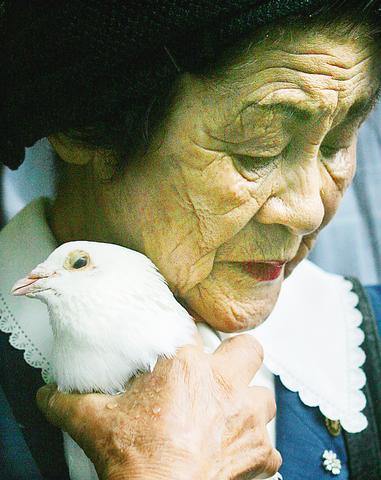Three Japanese state ministers visited a controversial war shrine yesterday as Japan commemorated the 59th anniversary of its surrender in World War II.
About 6,000 people including aging veterans and relatives of war dead as well as Emperor Akihito and Empress Michiko attended a ceremony at the Budokan Hall on the edge of Tokyo's Imperial Palace grounds.

PHOTO: REUTERS
But in a move likely to spark protests from Asian countries, three state ministers visited the controversial Yasukuni shrine, widely seen as a symbol of Japan's former militarism.
The three were Economy, Trade and Industry Minister Shoichi Nakagawa, Agriculture, Forestry and Fisheries Minister Yoshiyuki Kamei and National Public Safety Commission chairwoman Kiyoko Ono.
They were joined by about 50 members of parliament, led by former prime minister Tsutomu Hata.
The Yasukuni shrine, which is next to the Imperial Palace, honors 2.5 million Japanese fallen in modern wars, including wartime prime minister General Hideki Tojo.
Prime Minister Junichiro Koizumi made his controversial annual pilgrimage to the shrine on January 1 this year, leading to protests from China, North Korea, South Korea and Taiwan.
In an address during the ceremony, Koizumi expressed his oft-expressed remorse for Japan's aggression against its Asian neighbors and renewed his pledge to renounce the war.

PRECARIOUS RELATIONS: Commentators in Saudi Arabia accuse the UAE of growing too bold, backing forces at odds with Saudi interests in various conflicts A Saudi Arabian media campaign targeting the United Arab Emirates (UAE) has deepened the Gulf’s worst row in years, stoking fears of a damaging fall-out in the financial heart of the Middle East. Fiery accusations of rights abuses and betrayal have circulated for weeks in state-run and social media after a brief conflict in Yemen, where Saudi airstrikes quelled an offensive by UAE-backed separatists. The United Arab Emirates is “investing in chaos and supporting secessionists” from Libya to Yemen and the Horn of Africa, Saudi Arabia’s al-Ekhbariya TV charged in a report this week. Such invective has been unheard of

US President Donald Trump on Saturday warned Canada that if it concludes a trade deal with China, he would impose a 100 percent tariff on all goods coming over the border. Relations between the US and its northern neighbor have been rocky since Trump returned to the White House a year ago, with spats over trade and Canadian Prime Minister Mark Carney decrying a “rupture” in the US-led global order. During a visit to Beijing earlier this month, Carney hailed a “new strategic partnership” with China that resulted in a “preliminary, but landmark trade agreement” to reduce tariffs — but

Chinese President Xi Jinping’s (習近平) purge of his most senior general is driven by his effort to both secure “total control” of his military and root out corruption, US Ambassador to China David Perdue said told Bloomberg Television yesterday. The probe into Zhang Youxia (張又俠), Xi’s second-in-command, announced over the weekend, is a “major development,” Perdue said, citing the family connections the vice chair of China’s apex military commission has with Xi. Chinese authorities said Zhang was being investigated for suspected serious discipline and law violations, without disclosing further details. “I take him at his word that there’s a corruption effort under

China executed 11 people linked to Myanmar criminal gangs, including “key members” of telecom scam operations, state media reported yesterday, as Beijing toughens its response to the sprawling, transnational industry. Fraud compounds where scammers lure Internet users into fake romantic relationships and cryptocurrency investments have flourished across Southeast Asia, including in Myanmar. Initially largely targeting Chinese speakers, the criminal groups behind the compounds have expanded operations into multiple languages to steal from victims around the world. Those conducting the scams are sometimes willing con artists, and other times trafficked foreign nationals forced to work. In the past few years, Beijing has stepped up cooperation